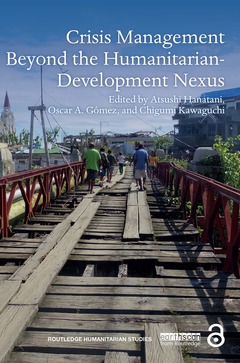Crisis Management Beyond the Humanitarian-Development Nexus Routledge Humanitarian Studies Series
Coordonnateurs : Hanatani Atsushi, Gómez Oscar A., Kawaguchi Chigumi

In addressing humanitarian crises, the international community has long understood the need to extend beyond providing immediate relief, and to engage with long-term recovery activities and the prevention of similar crises in the future. However, this continuum from short-term relief to rehabilitation and development has often proved difficult to achieve. This book aims to shed light on the continuum of humanitarian crisis management, particularly from the viewpoint of major bilateral donors and agencies. Focusing on cases of armed conflicts and disasters, the authors describe the evolution of approaches and lessons learnt in practice when moving from emergency relief to recovery and prevention of future crises.
Drawing on an extensive research project conducted by the Japan International Cooperation Agency Research Institute, this book compares how a range of international organizations, bilateral cooperation agencies, NGOs, and research institutes have approached the continuum in international humanitarian crisis management. The book draws on six humanitarian crises case studies, each resulting from armed conflict or natural disasters: Timor-Leste, South Sudan, the Syrian crisis, Hurricane Mitch in Honduras, the Indian Ocean earthquake and tsunami in Indonesia, and Typhoon Yolanda. The book concludes by proposing a common conceptual framework designed to appeal to different stakeholders involved in crisis management.
Following on from the World Humanitarian Summit, where a new way of working on the humanitarian-development nexus was highlighted as one of five major priority trends, this book is a timely contribution to the debate which should interest researchers of humanitarian studies, conflict and peace studies, and disaster risk-management.
Part 1: Background and Foundation 1. Introduction: Addressing the humanitarian-development nexus since the Cold War Yukie Osa and Atsushi Hanatani 2. A theory for the continuum: Multiple approaches to humanitarian crises management Oscar A. Gómez and Chigumi KawaguchiPart 2: Humanitarian Crisis Management in Armed Conflicts 3. The continuum in the management of armed conflict: An overview Toshiya Hoshino and Chigumi Kawaguchi 4. Should the ‘Continuum’ for peacebuilding focus on development or conflict prevention? The case of Timor-Leste Yukako Sakabe Tanaka and Tomoaki Honda 5. Comparative analysis of donor approaches to the continuum under a fragile peace: The case of South Sudan Chigumi Kawaguchi 6. The Syrian Civil War: Politicization of the crisis and challenges and dilemmas for humanitarian response Ryoji TateyamaPart 3: Humanitarian Crisis Management of Disasters 7. The continuum in the management of disasters: An overview Hiroshi Higashiura and Oscar A. Gómez 8. Prevention through the continuum of crisis management: The case of Honduras after Hurricane Mitch Oscar A. Gómez 9. How can recovery be linked with long-term development? The case of Indonesia Mikio Ishiwatari 10. Typhoon Yolanda in the Philippines: Qualitative analysis of institutional and political factors influencing the continuum Yasuhito Jibiki and Yuichi Ono 11. Conclusion: The continuum beyond the humanitarian-development nexus Atsushi Hanatani, Oscar A. Gómez and Chigumi Kawaguchi
Atsushi Hanatani is Senior Advisor and former Senior Director of the Office for Peacebuilding and Reconstruction at the Japan International Cooperation Agency.
Oscar A. Gómez is Research Fellow at the Japan International Cooperation Agency Research Institute.
Chigumi Kawaguchi is Research Fellow at the Japan International Cooperation Agency Research Institute.
Date de parution : 03-2020
15.6x23.4 cm
Date de parution : 10-2018
15.6x23.4 cm
Mots-clés :
Humanitarian Aid; crisis management; DRM; disaster management; Peacebuilding Architecture; risk management; South Sudan; crisis prevention; EU Experience; humanitarian; Humanitarian Crisis Management; humantiarian development nexus; DRR; NGOs; Consolidated Inter-Agency Appeal; Bilateral agencies; East Timor; Japan International Corporation Agency Research Institute; Timor Leste; JICA-RI; Bilateral Cooperation Agencies; Peacebuilding; Tacloban City; Conflict prevention; Civil Society; Honduras; DRR Education; Typhoon Yolanda; Red Crescent Movement; Timor-Leste; USAID’s Assistance; OLS; Indonesian Tsunami; Relief Phase; Hurricane Mitch; Wash; Syrian Civil War; Echo; Oscar A; Gmez; DRM System; Chigumi Kawaguchi; Aquino III; Yukie Osa; Prevention Phase; Toshiya Hoshino; PNTL; Yukako Sakabe Tanaka; Cross-border Assistance; Tomoaki Honda; Ryoji Tateyama; Hiroshi Higashiura; Mikio Ishiwatari; Yasuhito Jibiki; Yuichi Ono



